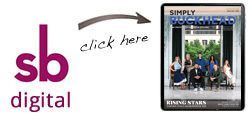Try the new “loud budgeting” social media trend with tips from a Buckhead wealth advisor.


Earlier this year, comedian and writer Lukas Battle went viral with a TikTok post in which he explained to viewers that he would not be going out to dinner because he only had “$7 a day to live on.” While said in jest, his decision to engage in what he has coined “loud budgeting” has taken social media by storm. The growing trend involves people sharing public posts about their finances in an effort to take control of their money and make better spending decisions. Here, Ben Glassman, private wealth advisor and director of financial planning with Northwestern Mutual’s Haven Wealth Advisors in Buckhead, discusses the pros and cons of loud budgeting and offers his tips for giving it a try.
What are the benefits of loud budgeting?
Loud budgeting empowers people, particularly the younger generation, to be more vocal about their spending habits than we have seen in previous generations. It allows people to establish clear financial boundaries when facing pressure to spend. Finances have historically been viewed as a more private matter, often discussed within a household or with a financial advisor. Loud budgeting has created a sense of community where people are opening up about the details of their financial situations and discussing the challenges of making [monetary] decisions. Once someone puts something out there on TikTok or YouTube, that often keeps them, particularly those in the younger generation, more accountable.
What kind of information should I share if I want to start loud budgeting?
I think it depends on how loud you want to be. We have to be mindful of not oversharing. Goal-oriented conversations are really important. For instance, I think identifying areas of day-to-day spending where we can make changes is a great place to start. Discussing a spending plan instead of a budget, which has developed a negative connotation and can be associated with financial stress or life deprivation, can be helpful. In fact, I think loud budgeting is working to destigmatize the discussion by making a public commitment to normalize money conversations through open and honest dialogue.
What should I not share online when loud budgeting?
The specifics of your personal financial situation in a world of technology could lead to an increased risk of fraud or identity theft. Just remember that when things are put out there, it’s really hard, if not impossible, to take them back. I think the boundary comes when you get too detailed with specifics: your financial institutions, bank accounts, specific numbers and dollar amounts.
How do I make sure that my loud budgeting is effective?
I think engaging with a professional financial advisor is a really important second step for that accountability piece. An advisor can give you open, neutral feedback to make sure you’re on the right track. Through comprehensive and holistic planning, an advisor can equip you with the tools you need to align the dollars that you have with the goals you’ve laid out while being mindful of things like taxes, inflation, interest rates and liquidity. Always start with a plan.
HAVEN WEALTH ADVISORS
(A NORTHWESTERN MUTUAL PRIVATE CLIENT GROUP)
404.846.3600
hwa.nm.com
@havenwealthadvisors
15 Minutes With columnist at Simply Buckhead. Freelance feature writer, children’s book author and President of Green Meadows Communications, LLC.











